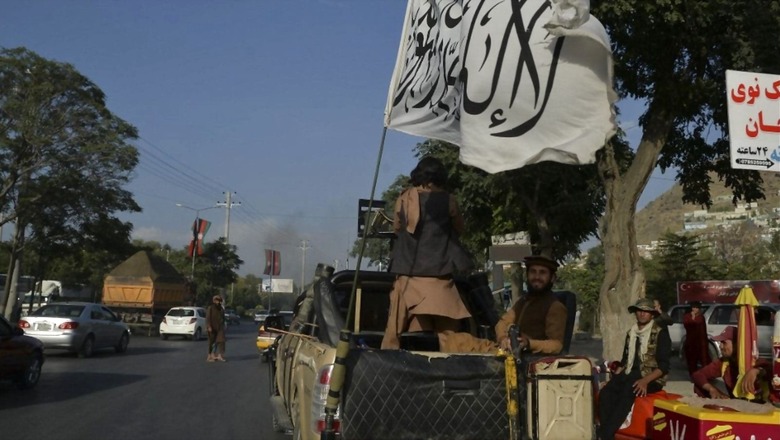
views
A redacted declassified 2006 document from the US Defense Intelligence Agency about Ibrahim Sadr says, “Originally from Kandahar province, he is living in Charsada, in Pakistan’s Peshawar, controlling Taliban fighters in the area”. The document further adds that Ibrahim Sadr also directs other Taliban members to attack coalition forces in Afghanistan, mentioning his phone number. As per the document, Ibrahim Sadr was also responsible for distributing monthly stipends to regional Taliban leaders involved in anti-coalition attacks in Afghanistan. As per the declassified document, he controlled and directed Taliban fighters in north-eastern Afghanistan, most notably in the provinces of Laghman, Nangarhar and Konar.
That Taliban commander has been appointed as the acting interior minister of Afghanistan by the group after its rapid takeover of the country to give a message on the way ahead for the Taliban. This comes even as former Afghan president Ashraf Ghani and vice-president Amrullah Saleh calling for a decisive fight against the Taliban. But the move could also be a way to placate Sadr after leading Taliban forces to almost a victorious position in Afghanistan as he handed over his position to Mullah Muhammad Yaqoob, Taliban founder Mullah Omar’s son
ALSO READ | EXCLUSIVE | Pakistan Was at Taliban’s ‘Service’, More Money US Paid for Cooperation, More Pak Supported Hardliners: Amrullah Saleh
Who is Ibrahim Sadr?
Ibrahim Sadr has been with the Taliban since its emergence in 1994. Before that, he was involved in the Mujahideen battle against the Soviet troops. Sadr was from Afghanistan’s Alakozai tribe and his name was Khodaidad. He changed his name to Ibrahim, which is the name of a prophet from Islam. Many reports claim that he is not from Kandahar province but from Helmand province. After the war with the Soviet troops ended, he shifted to Peshawar in Pakistan to teach in a madrassa where Sadr or president title was added to his name by the students there says a report from the Asia Times.
Ibrahim Sadr was given the responsibility to control the Taliban’s defence department managing Soviet fighter jets, helicopter gunships and transport planes after the Taliban’s takeover in 1996 and he played an important role in locating the Taliban’s enemies to rise in the ranks. An extreme hardliner in his religious views, Sadr used his days in the previous Taliban government to develop close contacts with jihadist or terrorist groups and became quite close to Al Qaeda.
Meteoric Rise
During the US attack in 2001, Sadr was the Taliban’s mid-level commander defending Kabul. After the Taliban fled Kabul and Afghanistan, Sadr decided to disappear and again shifted his base to Peshawar in Pakistan. His location was not known to the outside world. It was the time when his meteoric rise in the Taliban started. He was very close to Taliban founder Mullah Omar, and Akhtar Mansour who succeeded Mullah Omar.
From an influential Taliban commander, he was appointed Taliban’s military chief in 2014. Taliban announced it in 2016. An analysis by The Asia Times calls him the person who drove the US out of Afghanistan. The Taliban, under his military leadership, started the current phase of the offensive in 2016. That year, Mullah Haibatullah Akhundzada became the Taliban’s supreme leader after Akhtar Mansour was killed in a US drone strike.
The person who led the charge in Kandahar and Helmand provinces soon started targeting Afghan cities to force Afghan troops and international forces. Ibrahim Sadr transformed the Taliban into a well-trained guerilla force that could carry out large scale urban attacks. He adopted widespread use of terror war techniques like assassinations, suicide attacks and roadside bombings.
And gradually, with the Taliban’s military success in Afghanistan, he became so powerful and independent that he would be able to break away from the Taliban ranks. A way out for the Taliban leadership was to give the position of the military chief to someone else, in this case to Mullah Yaqoob, Mullah Omar’s son.
A UN Security Council (UNSC) report on Taliban in May 2021 reads, “The independent operations and power wielded by Taliban field commanders have reportedly been a growing concern to the Leadership Council. As reported by the Monitoring Team in its previous report, tensions between the political leadership and some military commanders, such as Sadr Ibrahim Sadr and Mullah Abdul Qayyum Zakir, reflect ongoing internal rivalries, tribal divisions and disagreements over Taliban revenue distribution.”
As per the UNSC monitoring report, Ibrahim Sadr ‘built his own forces, that traditionally operated across several provinces. While these forces have, in some cases, served to bolster larger Taliban operations, they have also on occasion failed to send forces in operations deemed likely to incur high casualties.”
ALSO READ|EXPLAINED: Under US, Afghanistan Held Multiple Polls To Install Democracy. Here’s How Taliban Won In The End
Too Much Power?
Taliban leadership council feared that Ibrahim Sadr and other such independent Taliban commanders, with their own powerful armies, will send a wrong message to rivals and to the outside world that the Taliban is no more a united group as it claims. The top Taliban leadership also feared that these ‘independent’ commanders could contradict leadership guidelines given to them, taking their own decisions.
So, in February 2021, the Taliban banned its splinter groups. Taliban commanders, including Ibrahim Sadr, were ordered not to operate in other provinces. They were also instructed not to join the Taliban forces operating in other provinces.
The latest move by the Taliban may thus be a step to placate Ibrahim Sadr and soon other powerful and independent Taliban commanders may be accommodated as well to appease them after the recent Taliban decisions against them.
But the big question is, will they remain loyal to the Taliban’s leadership in future when they have already challenged it? An analysis by the Washington-based Middle East Institute said that Ibrahim Sadr was still quite close to Al Qaeda. Will he accept the Taliban’s intent and assurance to the international community and China that the Taliban will not support Al Qaeda this time, especially when he has been made the interior minister of the country that looks after the internal security mechanism in the country that deals with terror groups directly?
Read all the Latest News, Breaking News and Assembly Elections Live Updates here.


















Comments
0 comment